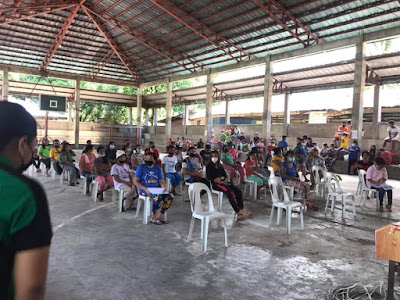PCIC, NMIS Caraga urge hog raisers to insure pigs
By Venus L. Garcia
SURIGAO CITY, Surigao del Norte (PIA)
-- To safeguard the interests and investments of local hog raisers and industry
players, Dr. Bernadette Montenegro, action officer of the National Meat
Inspection Service (NMIS) Caraga, and the Philippine Crop Insurance Corporation
is encouraging them to avail of the regular livestock insurance program.
This is in support to the Department
of Agriculture’s (DA’s) effort in recognition of the urgency of the situation
the hog industry is currently in especially with the seasonal prevalence of the
African swine fever (ASF).
Backyard and commercial swine raisers
are urged to have their stocks insured, as these insurance packages will help
protect their livelihoods in case their farms are affected by the ASF.
Dr. Montenegro also underscored
during a virtual briefing on Swine Mortality Insurance hosted by the DA-Caraga
on Friday the need for immediate depopulation of pigs infected by the ASF to
control the spread or even completely eradicate the ASF in the region.
She also urged the hog raisers and
traders to cooperate and not to sell live or dead pigs or pork products
infected with the said viral disease.
Hog raisers can apply for insurance
online on the Philippine Crop
Insurance Corporation (PCIC) website or visit any of its regional
offices, provincial extension offices, and service desks.
“Hog raisers must take advantage of
the government’s free insurance coverage which is part of DA’s broader goal
under the hog repopulation program,” said Dr. Montenegro.
The intended beneficiary-participants
of the Swine Repopulation Insurance Program of the DA-PCIC are backyard swine
raisers listed in the Registry System for Basic Sectors in Agriculture (RSBSA),
farmers cooperative or associations, commercial farm operators, local
government units, state colleges and universities.
Based on the minimum requirements for
the Swine Repopulation Insurance Program, the provincial and municipal
governments that have jurisdiction over the farms of these beneficiaries must
have adopted harmonized ordinance relevant and pertaining to the prevention and
control of ASF.
The municipal government must have
prepared and is implementing and regularly updating a Municipal ASF Control and
Prevention Plan aligned with the regional initiatives of the DA Regional Field
Office, the PCIC said.
In addition to the minimum
requirements for the Swine Repopulation Insurance Program, the local government
must have organized the Bantay ASF sa Barangay; the hog farms are registered
with the local government unit; operations must be compliant with Biosecurity
Level 1 standards; and farmers, or in case of commercial farms, owners and
staff have been trained in biosecurity procedures.
The PCIC has allotted P600 million
from its current budget for the Swine Repopulation Insurance Program. The
amount shall be used either as insurance premium subsidy or indemnity payment
for assured RSBSA listed hog raisers. The DA will provide additional fund, if
needed.
For backyard swine
raisers/smallholders, the premium subsidy under the Swine Repopulation
Insurance Program shall be 100% of the premium cost or full premium subsidy,
while for commercial swine raisers, the premium subsidy shall be at such rate
of the premium cost as may be agreed upon by the DA and PCIC.
Swine Repopulation Insurance Program
includes the following policy condition: Hog raiser farm should be in an area
cleared for repopulation or in the green zone; hog raiser must be a registered
practitioner of the biosecurity under the Bantay ASF Program; the insured shall
be the sole owner or co-owner of the livestock subject for insurance coverage;
the insured livestock should remain within the premises of the farm of the
insured; and the hog farm must be supervised by a hog technician or a
veterinarian.
The responsible agencies are continuously monitoring the status of ASF in the entire region wherein pigs are recently detected to have been infected in barangay Florida, Butuan City. (VLG/PIA-Suriao del Norte)
















